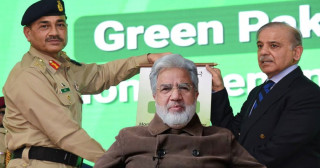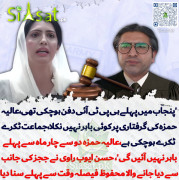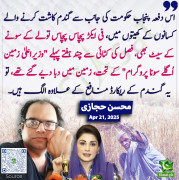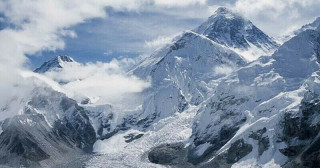You are using an out of date browser. It may not display this or other websites correctly.
You should upgrade or use an alternative browser.
You should upgrade or use an alternative browser.
1st STEP TOWARDS REVOLUTION(TLY)
- Thread starter atifnaeem73
- Start date
canadian
Chief Minister (5k+ posts)
What Al Jazeera did right: This revolution was televised !!!

What Al Jazeera did right: This revolution was televised
February 18, 2011 Posted by Farheen Hussain
Posted by Farheen Hussain

Al Jazeera made a conscious effort for their coverage to mirror the momentum of the revolution.
My friend, a fellow news junkie, asked me, Whats the difference between CNN and Al Jazeera?
Answer: CNN shows the missiles taking off, Al Jazeera shows them landing.
If any amongst us had doubts about this subtle difference, they were most certainly removed after following the Egyptian revolution unfold on Al Jazeera and its sanitised coverage on other mainstream western news networks.
To further substantiate Al Jazeeras credentials as the peoples news network that brings forth the peoples perspective devoid of an imperialist agenda, I can tell you this; Donald Rumsfeld condemned it, George Bush allegedly said he wanted to bomb it and all those hard core tea-partying, Republicans consider it their Fox News.
For over two weeks till the ouster of Hosni Mubarak I found myself drawn into the romanticism, passion and hope that only a true peoples revolution can inspire.
I followed Al Jazeeras phenomenal coverage of the Egyptian revolution through its live streaming on internet and Twitter accounts of its embedded journalists reporting live from the ground.
Alongside, I kept a close watch on the coverage by other western mainstream channels I had access to, namely BBC, Sky News, CNN and for sheer entertainment, Fox News.
The potency of media only becomes evident when it covers a movement that is as fluid, volatile, and populist, with multiple angles and perspectives as the Egyptian revolution. What a specific news network chooses to reinforce, what they choose to downplay, the language they frame it in and the approach they adopt has huge implications on the opinions the millions of viewers detached from the ground reality will formulate.
Coverage capturing the vibe
Given that Al Jazeeras headquarters are embedded in the Middle East, and it has far more resources and networks available, it is only fair that the time they devoted to the revolution and efficiency in covering breaking news superseded that of others. However, apart from these understandable differences, Al Jazeera made a conscious effort for their coverage to mirror the momentum of the revolution on the ground. The same coverage on CNN or other channels would be oft interrupted by lengthy pieces on the automobile industry, snow storms in America, the Super Bowl and even preparations for the royal weddings; cunningly deflating the energy that reverberates in the viewers when watching the protests.
Diverse angles, diverse content
While Al Jazeeras offices and journalists were attacked and the channel taken off air in Egypt by Mubaraks government, no such action was taken against other mainstream western news networks.
If anything this gives validation to the channels struggle to expose the truth. Conversely, the other mainstream western news channels found it too much to stomach that this revolution was in fact orchestrated and sustained by the secular, youth bulge of Egypt. They displayed an overwhelming need to give the Egyptian revolution an Islamist bent with anchors on CNN and BBC consistently calling analysts and diplomats to comment on the likelihood of a Khomeni like takeover and obsessively discussing the Islamist credentials of the Muslim Brotherhood and their popularity amongst the Egyptian people.
For the most part, their coverage consisted of a small inset of the Tahrir Square and a stodgy analyst or suited diplomat in the foreground waxing lyrical about Mubaraks role in forging peace in the Middle East and indispensability to the west.
During the most crucial moment of the revolution, before Mubaraks address to the Egyptian people, Al Jazeera remained anchored in the streets of Cairo and Alexandria capturing the peoples sentiment. Simultaneously, channels like CNN were intent on humanising the dictator by running profiles of Hosni Mubarak, as an analyst droned on about a post Mubarak Egypt, subtly pushing the false autocratic rule or Islamist takeover binary.
Lastly, true to form, Fox News coverage of the Egyptian revolution through its bevy of blondes and right-wing evangelists, amped the sleaze factor of their channel to heights hardcore pornographers are still aspiring to reach.
Al Jazeeras people-centric approach
The sanitised coverage of western mainstream channels and usage of generic language has the impact of detaching the viewers from those engaged in the revolution.
The reality and rawness of the Egyptian revolution was captured by Al Jazeera because it took a truly people centric approach; anchoring their journalists amongst those on the streets and letting the people tell their story not have it told by an endless stream of analysts and diplomats disconnected from the eye of the storm.
Similarly, the nuanced differences in language between channels became increasingly apparent; while CNN, BBC preferred to use words like crisis or protests, Al Jazeera befittingly called it a revolution.
When Hosni made the anti-climatic speech in which he declared he was not stepping down, western news channels described the protesters as deflated, whereas Al Jazeera remained anchored in Tahrir and let the viewers at home feel the reverberation of the chants that grew louder and angrier; with the voiceover describing the mood as having shifted from, angry to volcanic.
Though it gave due coverage to all aspects of the revolution, Al Jazeeras primal focus was interviewing the protesters themselves; after all this was the peoples revolution, why distract from their passion, their grievances and their motives.
The explosive 2003 documentary, This Revolution will not be televised captured the real story (http://blogs.tribune.com.pk/story/4437/what-al-jazeera-did-right-this-revolution-was-televised/)
What Al Jazeera did right: This revolution was televised
February 18, 2011
 Posted by Farheen Hussain
Posted by Farheen Hussain
Al Jazeera made a conscious effort for their coverage to mirror the momentum of the revolution.
My friend, a fellow news junkie, asked me, Whats the difference between CNN and Al Jazeera?
Answer: CNN shows the missiles taking off, Al Jazeera shows them landing.
If any amongst us had doubts about this subtle difference, they were most certainly removed after following the Egyptian revolution unfold on Al Jazeera and its sanitised coverage on other mainstream western news networks.
To further substantiate Al Jazeeras credentials as the peoples news network that brings forth the peoples perspective devoid of an imperialist agenda, I can tell you this; Donald Rumsfeld condemned it, George Bush allegedly said he wanted to bomb it and all those hard core tea-partying, Republicans consider it their Fox News.
For over two weeks till the ouster of Hosni Mubarak I found myself drawn into the romanticism, passion and hope that only a true peoples revolution can inspire.
I followed Al Jazeeras phenomenal coverage of the Egyptian revolution through its live streaming on internet and Twitter accounts of its embedded journalists reporting live from the ground.
Alongside, I kept a close watch on the coverage by other western mainstream channels I had access to, namely BBC, Sky News, CNN and for sheer entertainment, Fox News.
The potency of media only becomes evident when it covers a movement that is as fluid, volatile, and populist, with multiple angles and perspectives as the Egyptian revolution. What a specific news network chooses to reinforce, what they choose to downplay, the language they frame it in and the approach they adopt has huge implications on the opinions the millions of viewers detached from the ground reality will formulate.
Coverage capturing the vibe
Given that Al Jazeeras headquarters are embedded in the Middle East, and it has far more resources and networks available, it is only fair that the time they devoted to the revolution and efficiency in covering breaking news superseded that of others. However, apart from these understandable differences, Al Jazeera made a conscious effort for their coverage to mirror the momentum of the revolution on the ground. The same coverage on CNN or other channels would be oft interrupted by lengthy pieces on the automobile industry, snow storms in America, the Super Bowl and even preparations for the royal weddings; cunningly deflating the energy that reverberates in the viewers when watching the protests.
Diverse angles, diverse content
While Al Jazeeras offices and journalists were attacked and the channel taken off air in Egypt by Mubaraks government, no such action was taken against other mainstream western news networks.
If anything this gives validation to the channels struggle to expose the truth. Conversely, the other mainstream western news channels found it too much to stomach that this revolution was in fact orchestrated and sustained by the secular, youth bulge of Egypt. They displayed an overwhelming need to give the Egyptian revolution an Islamist bent with anchors on CNN and BBC consistently calling analysts and diplomats to comment on the likelihood of a Khomeni like takeover and obsessively discussing the Islamist credentials of the Muslim Brotherhood and their popularity amongst the Egyptian people.
For the most part, their coverage consisted of a small inset of the Tahrir Square and a stodgy analyst or suited diplomat in the foreground waxing lyrical about Mubaraks role in forging peace in the Middle East and indispensability to the west.
During the most crucial moment of the revolution, before Mubaraks address to the Egyptian people, Al Jazeera remained anchored in the streets of Cairo and Alexandria capturing the peoples sentiment. Simultaneously, channels like CNN were intent on humanising the dictator by running profiles of Hosni Mubarak, as an analyst droned on about a post Mubarak Egypt, subtly pushing the false autocratic rule or Islamist takeover binary.
Lastly, true to form, Fox News coverage of the Egyptian revolution through its bevy of blondes and right-wing evangelists, amped the sleaze factor of their channel to heights hardcore pornographers are still aspiring to reach.
Al Jazeeras people-centric approach
The sanitised coverage of western mainstream channels and usage of generic language has the impact of detaching the viewers from those engaged in the revolution.
The reality and rawness of the Egyptian revolution was captured by Al Jazeera because it took a truly people centric approach; anchoring their journalists amongst those on the streets and letting the people tell their story not have it told by an endless stream of analysts and diplomats disconnected from the eye of the storm.
Similarly, the nuanced differences in language between channels became increasingly apparent; while CNN, BBC preferred to use words like crisis or protests, Al Jazeera befittingly called it a revolution.
When Hosni made the anti-climatic speech in which he declared he was not stepping down, western news channels described the protesters as deflated, whereas Al Jazeera remained anchored in Tahrir and let the viewers at home feel the reverberation of the chants that grew louder and angrier; with the voiceover describing the mood as having shifted from, angry to volcanic.
Though it gave due coverage to all aspects of the revolution, Al Jazeeras primal focus was interviewing the protesters themselves; after all this was the peoples revolution, why distract from their passion, their grievances and their motives.
The explosive 2003 documentary, This Revolution will not be televised captured the real story (http://blogs.tribune.com.pk/story/4437/what-al-jazeera-did-right-this-revolution-was-televised/)
hans
Banned
Re: What Al Jazeera did right: This revolution was televised !!!
One of the best lines I have ever read... super!
"My friend, a fellow news junkie, asked me, “What’s the difference between CNN and Al Jazeera?”
Answer: “CNN shows the missiles taking off, Al Jazeera shows them landing.”
One of the best lines I have ever read... super!
"My friend, a fellow news junkie, asked me, “What’s the difference between CNN and Al Jazeera?”
Answer: “CNN shows the missiles taking off, Al Jazeera shows them landing.”
The Revolution will not be Twitterised
“Correlation does not equal causation” should be the slogan stapled to the heads of the rabid global Twitterati, who believe their millions of one-line updates have played a major role in revolutions in Moldova, Iran, Tunisia, and now, Egypt.
Wake up call: revolutions do not take place in front of a keyboard or by sharing grainy photos of people getting beaten up or killed in the streets. Remember the hype around Neda Soltani, the Iranian woman who died protesting on the streets of Iran in 2009? No justice there, and no revolution either.
The reason why revolutions come and go, fail or succeed has very little (not nothing) to do with media coverage, and while ‘social media activists’ would argue otherwise, they need only look over to traditional media and real-world activism to get a handle on reality.
The revolution begins
Every journalist who has spent a fair amount of time on a single beat knows his/her success ratio in creating miniscule social change: one in 100. To create even a small wave of social change? One in a million.
These statistics apply to the real world social activist too, who rationally ranks her impact even lower as she has to start at the grassroots and lobby towards social change. These are the real heroes of any revolution; the ones who labour for decades before seeing results.
The revolution takes off
Once a wave of social change gets rolling though, you will see traditional media and social media start to pay attention. There will be more coverage, more visible debate, and this process is often erroneously labeled ‘activism’ when it is actually ‘hype’ around the work being done by the above, or just the socio-economic and political conditions of a country playing themselves out.
Please note: this occurs in the last stages of the revolution, and while online activists jumping on the bandwagon here may be the straw that broke the camel’s back, let’s just call a straw a straw, shall we?
Yes, hype does have a small role to play in revolutions, and currently, the novelty of covering hype on Twitter or Facebook has resulted in uber-hype. What could be easier and more engaging than to cover the coverage, especially when it makes every individual Facebook and Twitter user feel they are empowered (and celebs) via being reported about in the news? However, the erroneous argument here is that “the hype is causing change”.
No, the level of hype is just an indicator of change which is taking place – it is not the change maker itself.
The revolution climaxes
So now that the revolution has reached its peak, there will be millions of Twitter updates and article sharing and late-night discussions about ‘change and ‘revolt’. The revolution is now hip. Much akin to the logic presented by Adam Curtis in his documentary, ‘The Power of Nightmares’, dictators and evil regimes buy into the hype surrounding the efficacy of this online social activity, assume it’s a monster, get paranoid and delusional, and start cracking down on individual online social activists (particular case in point: Iran) or in the case of Hosni Mubarak, shut the internet down altogether.
From here on out, the revolution has emerged victorious – not because of the media being curbed, but because that act of curbing the media is an indicator to the degree to which the dictator/regime is powerless, thus forcing them to lash out at what is the weakest link in the revolution mix.
Step back from the ecstasy of witnessing social upheaval and the lesson for online activists is: congratulations, you are the weakest link. Thank you for your tiny blip of input, which probably had little impact on the revolution, but made for a great story in the end.
After the revolution
The revolution is now over and everyone is basking in collective glory. Time to reflect on some nuggets by foreign affairs commentator Evgeny Morozov:
“While the Internet could make the next revolution more effective, it could also make it less likely… we should consider how it empowers the government via surveillance, how it disempowers citizens via entertainment, how it transforms the nature of dissent by shifting it into a more virtual realm, how it enables governments to produce better and more effective propaganda, and so forth.”
For the birth of every new online social activist, there are a dozen others coming online to watch YouTube videos of silly monkeys in funny hats. The revolution will definitely be more visible online, with more people under the illusion that they are ‘taking part’ but that is not where revolutions are born and carried out; for the vast majority, that is where they are watched, with enough interactivity and engagement to feel as if you’re part of the experience.
Published in The Express Tribune, Sunday Magazine, February 20th, 2011.
“Correlation does not equal causation” should be the slogan stapled to the heads of the rabid global Twitterati, who believe their millions of one-line updates have played a major role in revolutions in Moldova, Iran, Tunisia, and now, Egypt.
Wake up call: revolutions do not take place in front of a keyboard or by sharing grainy photos of people getting beaten up or killed in the streets. Remember the hype around Neda Soltani, the Iranian woman who died protesting on the streets of Iran in 2009? No justice there, and no revolution either.
The reason why revolutions come and go, fail or succeed has very little (not nothing) to do with media coverage, and while ‘social media activists’ would argue otherwise, they need only look over to traditional media and real-world activism to get a handle on reality.
The revolution begins
Every journalist who has spent a fair amount of time on a single beat knows his/her success ratio in creating miniscule social change: one in 100. To create even a small wave of social change? One in a million.
These statistics apply to the real world social activist too, who rationally ranks her impact even lower as she has to start at the grassroots and lobby towards social change. These are the real heroes of any revolution; the ones who labour for decades before seeing results.
The revolution takes off
Once a wave of social change gets rolling though, you will see traditional media and social media start to pay attention. There will be more coverage, more visible debate, and this process is often erroneously labeled ‘activism’ when it is actually ‘hype’ around the work being done by the above, or just the socio-economic and political conditions of a country playing themselves out.
Please note: this occurs in the last stages of the revolution, and while online activists jumping on the bandwagon here may be the straw that broke the camel’s back, let’s just call a straw a straw, shall we?
Yes, hype does have a small role to play in revolutions, and currently, the novelty of covering hype on Twitter or Facebook has resulted in uber-hype. What could be easier and more engaging than to cover the coverage, especially when it makes every individual Facebook and Twitter user feel they are empowered (and celebs) via being reported about in the news? However, the erroneous argument here is that “the hype is causing change”.
No, the level of hype is just an indicator of change which is taking place – it is not the change maker itself.
The revolution climaxes
So now that the revolution has reached its peak, there will be millions of Twitter updates and article sharing and late-night discussions about ‘change and ‘revolt’. The revolution is now hip. Much akin to the logic presented by Adam Curtis in his documentary, ‘The Power of Nightmares’, dictators and evil regimes buy into the hype surrounding the efficacy of this online social activity, assume it’s a monster, get paranoid and delusional, and start cracking down on individual online social activists (particular case in point: Iran) or in the case of Hosni Mubarak, shut the internet down altogether.
From here on out, the revolution has emerged victorious – not because of the media being curbed, but because that act of curbing the media is an indicator to the degree to which the dictator/regime is powerless, thus forcing them to lash out at what is the weakest link in the revolution mix.
Step back from the ecstasy of witnessing social upheaval and the lesson for online activists is: congratulations, you are the weakest link. Thank you for your tiny blip of input, which probably had little impact on the revolution, but made for a great story in the end.
After the revolution
The revolution is now over and everyone is basking in collective glory. Time to reflect on some nuggets by foreign affairs commentator Evgeny Morozov:
“While the Internet could make the next revolution more effective, it could also make it less likely… we should consider how it empowers the government via surveillance, how it disempowers citizens via entertainment, how it transforms the nature of dissent by shifting it into a more virtual realm, how it enables governments to produce better and more effective propaganda, and so forth.”
For the birth of every new online social activist, there are a dozen others coming online to watch YouTube videos of silly monkeys in funny hats. The revolution will definitely be more visible online, with more people under the illusion that they are ‘taking part’ but that is not where revolutions are born and carried out; for the vast majority, that is where they are watched, with enough interactivity and engagement to feel as if you’re part of the experience.
Published in The Express Tribune, Sunday Magazine, February 20th, 2011.
Last edited:
aasimnaveed
MPA (400+ posts)
Re: what will lead to a revolution in pakistan ....just an example
oooooh hoooooooooooo ........ maaa ki baddua kuch bhi ker sakti hai ...... bacho iss seeeee
oooooh hoooooooooooo ........ maaa ki baddua kuch bhi ker sakti hai ...... bacho iss seeeee
rizamhz
Citizen
Re: what will lead to a revolution in pakistan ....just an example
a country which hands over its citizens to other countries for prosecution, a country where any foreigner can kill its citizens in the broad day light and its rulers deliberate how to give a safe passage to the murderer.......o meri dukhi maa, yahan insaaf talash mat karo...ab khuda ke qehar ka intezar karo jo anqareeb yahan girnay wala hai...jo achhon aur buroon sab ko apni lapait mei le le ga
a country which hands over its citizens to other countries for prosecution, a country where any foreigner can kill its citizens in the broad day light and its rulers deliberate how to give a safe passage to the murderer.......o meri dukhi maa, yahan insaaf talash mat karo...ab khuda ke qehar ka intezar karo jo anqareeb yahan girnay wala hai...jo achhon aur buroon sab ko apni lapait mei le le ga
Last edited:
arslan4u
Minister (2k+ posts)
Re: what will lead to a revolution in pakistan ....just an example
Khuda ke qehar ka intezar karne se acha hai khud is ghatia nizaam ko badalne ke liay niklo...
a country which hands over its citizens to other countries for prosecution, a country where any foreigner can kill its citizens in the broad day light and its rulers deliberate how to give a safe passage to the murderer.......o meri dukhi maa, yahan insaaf talash mat karo...ab khuda ke qehar ka intezar karo jo anqareeb yahan girnay wala hai...jo achhon aur buroon sab ko apni lapait mei le le ga
Khuda ke qehar ka intezar karne se acha hai khud is ghatia nizaam ko badalne ke liay niklo...
alibaba222
Minister (2k+ posts)
Re: what will lead to a revolution in pakistan ....just an example
Fido82 Bahi ager punjab may taklay bro ye kam ker rahye he tu sindh may mqm,anp,ppp ye kam ker rahee he , wasy pory pak may ye hal he ,Allah hamari in zalmoo say jan choraye
]
Fido82 Bahi ager punjab may taklay bro ye kam ker rahye he tu sindh may mqm,anp,ppp ye kam ker rahee he , wasy pory pak may ye hal he ,Allah hamari in zalmoo say jan choraye
]
Last edited by a moderator:
© Copyrights 2008 - 2025 Siasat.pk - All Rights Reserved. Privacy Policy | Disclaimer|



























